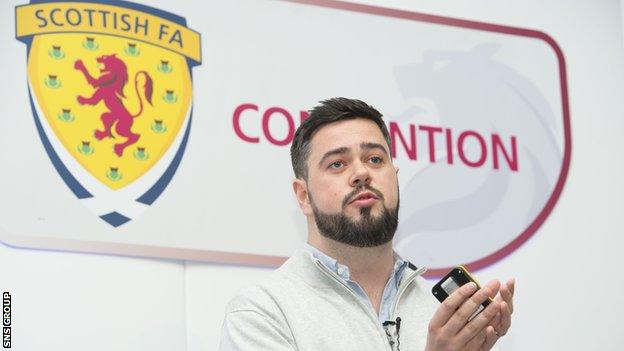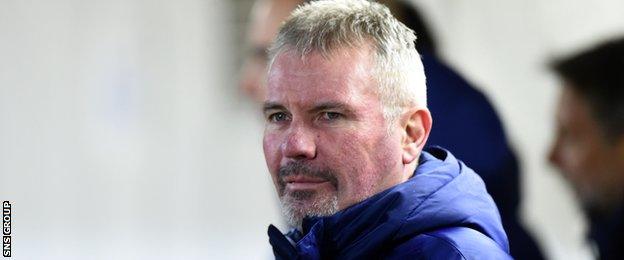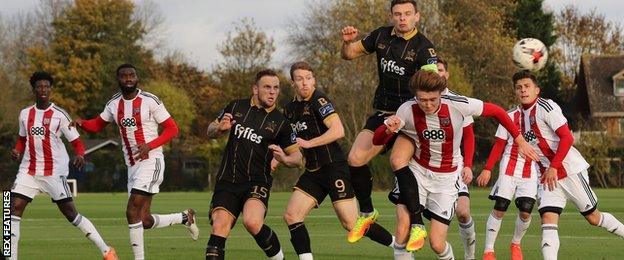Could Scottish club learn from B-team model used at Brentford?
- Published

Rowan addressing the SFA convention at Hampden
There were contributions from Brad Pitt and Steve Jobs, but Robert Rowan's presentation to the Scottish Football Association's annual convention would have made its impact without them.
He was invited to Hampden to provide an insight into his work at Brentford and the club's decision to close its academy and implement a B-team model.
Rowan, who previously worked for Stenhousemuir, Celtic and the SFA before moving south, is Brentford's head of football operations and he delivered a stark reminder of the difficult choices facing clubs.
After reviewing their academy, Brentford decided the probability of producing first-team players and fighting off other higher profile clubs was too big a risk for an investment of millions of pounds per year.
The context of his presentation made the content more relevant. The SFA is conducting a performance review, with the working group drawing up a list of potential proposals to be implemented by the incoming performance director.
They include reducing the number of fully-funded elite academies in Scotland - to focus resources on the very best players in the country - and encouraging development pathways for academy graduates to spend time on loan at lower league clubs, who would no longer run their own academies, for first-team experience.
Brentford are owned by Matthew Benham, whose Smartodds company provides statistical analysis that underpins the model at Brentford and his other club, FC Midtjylland in Denmark, so there has always been a focus on eschewing the traditional for innovative thinking.
The video clip of Pitt was from the film Moneyball, about statistical analysis in baseball - although Rowan reiterated that Brentford only use statistics as a tool during the decision-making process rather than to ultimately make the decisions.
The Jobs clip was about Apple's decision to focus their concentration on a small range of innovative developments rather than trying to do everything.
'Very hard to predict development'

The SFA are seeking a new performance director following Brian McClair's exit in July
"It's maximising your resources on as little an amount of people as possible," Rowan said.
"A lot of football clubs have a hierarchy of first team and academy. I disagree with that and believe that, like in business, to maximise the potential in your assets you need to give them the best resources.
"We sign players on two or three-year contracts in that elite age group, from 17 to 21, where there aren't so many variables or influential factors.
"We're looking at players who have fallen out the system from Chelsea, Arsenal, Tottenham, Manchester United, Man City, because it's inevitable they will make a few mistakes, that's the difficulty of recruitment - it's very hard to predict development."
Brentford calculated they would gain an advantage by closing their academy and signing players who don't make it through the academies at elite clubs, but have the ability to progress.
The current B-team squad also has youth internationals from Denmark and Greece aiming to break through.
For the Scottish game, there are interesting considerations, not least because some clubs may have to decide about the worth of maintaining their academy if it is no longer among the elite group - most likely to be no more than 16 - or if running a development set-up and taking or borrowing players from other academies may be a better scenario.
'Build it your own way'

Brentford B are not in a league, arranging friendlies like this meeting with Dundalk
"With this new club academy concept, [I would say to Scottish clubs] not to think that if you're not defined as elite that life is over with developing players, you need to think differently," Rowan said.
"It's ridiculous the amount of academies in this country. Germany have double the amount but have nearly 16 times the population of Scotland.
"You shouldn't always be scripted by a governing body. If you want to be a successful business or football club, you need to build it your own way, after considering what is sustainable, worthwhile and achievable within your environment.
"People might say you're not fulfilling your commitment to your community, but academies are elitist. They're like private schools, where the best kids gets in.
"Brentford's stadium is on the street alongside houses. That's our community, not the kids who travel two hours to train with the academy.
"Invest more in your community programmes, like walking football, that keep people fit and active.
"Our community department incorporate football for all, regardless of race, weight, size, background, age. Our responsibility now is to improve the connection with the elite part of the club."
First-team goal
Brentford's B-team has played under-23 teams from Chelsea, Liverpool and Manchester United, and the B teams of Bayern Munich and Valencia. They will also face Rangers in January.
The idea is to push the players in their development and prepare them for first-team football. They have played in front of attendances of 1,000 at home games, and the experience is designed to mimic, as much as possible, the conditions faced by first-team players.
There is also a "non-negotiable" pathway to the first-team, with a certain number of B-team players having to train with the first-team, and be involved with the match-day squad. The aim is to promote at least one player to the first team by the end of the season.
"A few clubs have asked us about it, one in Scotland," Rowan said. "You get people who are sceptical and people who think it's innovative and brave."